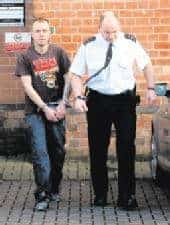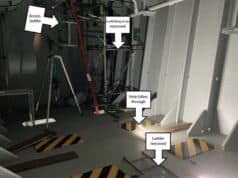A CORONER recorded an open verdict into the death of a homeless man who died from a heroin overdose, as it could not be established who injected him.
Robert Mitchell, 33, was found dead at Milestone House shelter following a drug and alcohol binge. Derby Coroner’s Court heard the unemployed scaffolder got others to inject heroin into his neck, as he could not see to do it himself.
Mr Mitchell’s cousin, Jordan Burgess, also a resident at the shelter in Green Lane at the time of Mr Mitchell’s death, had been accused by Coroner Dr Robert Hunter of administering the fatal injection on June 4 last year.
Dr Hunter said evidence suggested it was “likely” the injection took place inside Mr Burgess’s room after 2am.
CCTV showed Mr Mitchell did not leave the room after that time, while Mr Burgess came and left on several occasions.
But during cross-examination, Mr Burgess, who is in prison for an unrelated offence, denied he administered the fatal injection.
“I did not inject Robert,” he said.
The inquest heard police found traces of heroin and an empty syringe wrapper inside the room, but could not find a needle or syringe.
Mr Burgess said he woke at about 9.30am to find Mr Mitchell unconscious and initially claimed he “straight away” alerted staff.
But CCTV footage showed him then leaving his room before reporting what had happened 18 minutes later.
Asked if he took the syringe or anything else from the room, or tidied it up prior to the police arriving, Mr Burgess said: “No.”
Dr Hunter said he could not record a verdict of unlawful killing as he could not be sure beyond reasonable doubt that Mr Burgess administered the fatal dose.
He said it was possible Mr Mitchell could have used a mirror, or located the vein using his hands, to inject himself.
There was also a 43-second period in which Mr Mitchell left the room at around 1am, in which he could have injected himself elsewhere in the building, accounting for no needle being found by police.
Dr Hunter said the uncertainty meant he could also not record a verdict of misadventure, as he could not be sure Mr Mitchell had injected himself.
“Therefore, the only verdict left available to me is an open verdict,” he said.
Suicide was also ruled out despite Mr Mitchell being “depressed” at not having access to his son.
Home Office pathologist Professor Guy Rutty said a combination of alcohol and drugs killed Mr Mitchell, whose “tolerance levels” to drugs could have been lowered during time he spent in prison prior to his death.
Via: www.thisisderbyshire.co.uk























